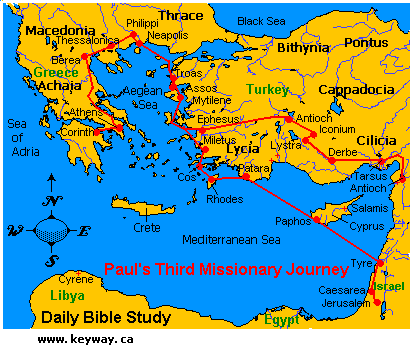
ἀποσπασθέντας (apospasthentas) — 1 Occurrence
Acts 21:1 V-APP-AMP
GRK: ἀναχθῆναι ἡμᾶς ἀποσπασθέντας ἀπ' αὐτῶν
NAS: When we had parted from them and had set sail,
KJV: that after we were gotten from them,
INT: sailed we having drawn away from them
The Prison Epistles: Philippians, Ephesians, Colossians, Philemon
Warnings on the Journey to Jerusalem
21 After we tore ourselves away from them and set sail, we came by a direct route to Cos, the next day to Rhodes, and from there to Patara. 2 Finding a ship crossing over to Phoenicia, we boarded and set sail. 3 After we sighted Cyprus, leaving it on the left, we sailed on to Syria and arrived at Tyre, because the ship was to unload its cargo there. 4 So we found some disciples and stayed there seven days. Through the Spirit they told Paul not to go to Jerusalem. 5 When our days there were over, we left to continue our journey, while all of them, with their wives and children, escorted us out of the city. After kneeling down on the beach to pray, 6 we said good-bye to one another. Then we boarded the ship, and they returned home.
7 When we completed our voyage from Tyre, we reached Ptolemais, where we greeted the brothers and stayed with them one day. 8 The next day we left and came to Caesarea, where we entered the house of Philip the evangelist, who was one of the Seven, and stayed with him. 9 This man had four virgin daughters who prophesied.
10 While we were staying there many days, a prophet named Agabus came down from Judea. 11 He came to us, took Paul’s belt, tied his own feet and hands, and said, “This is what the Holy Spirit says: ‘In this way the Jews in Jerusalem will bind the man who owns this belt and deliver him into Gentile hands.’” 12 When we heard this, both we and the local people begged him not to go up to Jerusalem.
13 Then Paul replied, “What are you doing, weeping and breaking my heart? For I am ready not only to be bound but also to die in Jerusalem for the name of the Lord Jesus.”
14 Since he would not be persuaded, we stopped talking and simply said, “The Lord’s will be done!”
Ancient city of Patara
PATARA
Patara (Patar in Hittite language, Pttara in Lycian language) is located near the Gelemiş village in Antalya province on the southwestern coast of Turkey. Patara, an ancient Lycian harbor city, can be dated back to the 8th century B.C. It is said that the city was founded by Patarus, a son of Apollo. In ancient times, the Xanthus River flowed through Patara, where was the only entrance to the Xanthos valley. Thus Patara became a very important harbor city and flourished because of trade throughout history.
In 333 B.C., the city of Patara was captured by Alexander the Great. During the Wars of Alexander’s successors (322-275 BC), the city was occupied by Antigonus and then by Demetrius. Finally it fell to the Ptolemies of Egypt. Ptolemy Philadelphus of Egypt named the city Arsinoe (Arsinoë) after Arsinoe II of Egypt, who was his wife and sister. However the name of the city was continued to be Patara. In 196 B.C., Antiochus III took Patara. The city with the rest of Lycia was granted its freedom as a Roman ally in 167 B.C. In 88 B.C., Mithridates IV, king of Pontus, besieged Patara, and the city was captured by Brutus and Cassius during their campaign against Mark Antony and Augustus. In 43 A.D., Patara was annexed to the province of Pamphylia by the Roman Empire. The city was one of the six leading cities of ancient Lycia, along with Xanthos, Olympos, Pinara, Tlos and Myra. The council meetings were held in the parliament building in Patara. The city became the capital of Lycia and Pamphilia provinces. In Roman times, Patara was the major naval and trading port of Lycia. Grains were stored and shipped from the Port of Patara. In the Byzantine period, Patara became an important city for Christians. It is known that Patara was the birthplace of St. Nicholas (ca. 280-343), who lived in the town of Myra (Demre). (For further information about St. Nicolas, please visit the site of Myra.) During the wars between the Turks and the Byzantines, the city declined and was mostly abandoned. After the 16th century, the port of Patara began to be filled with blowing sand. Ships were not able to approach the dock and thus Patara lost its importance as a port.


No comments:
Post a Comment